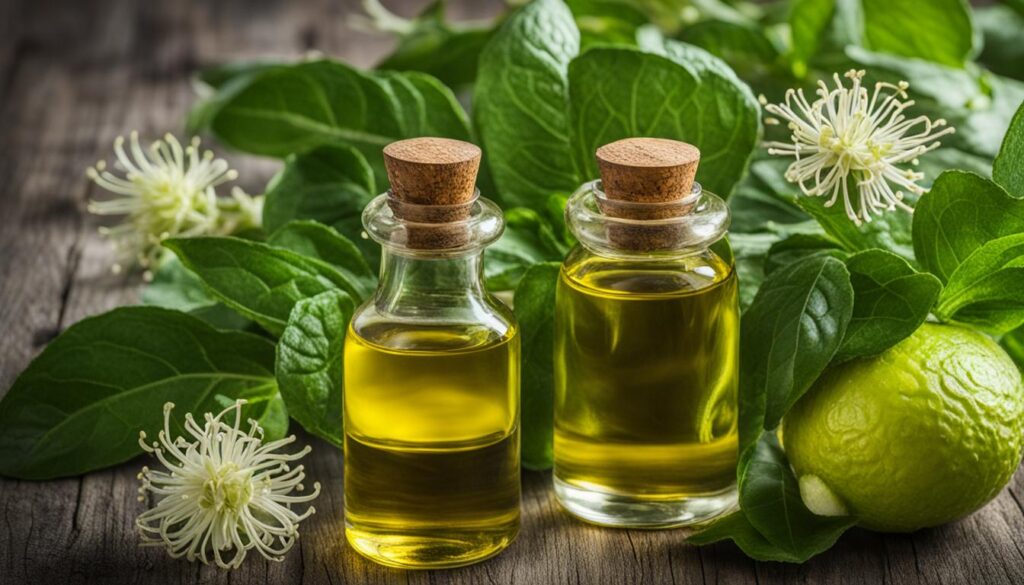Bergamot oil has a wide range of potential uses and benefits. It is extracted from the rinds of citrus fruit (Citrus bergamia) and is known for its soothing scent and spicy taste. The bergamot tree is believed to have originated in Southeast Asia and is currently grown in various parts of the world. Bergamot oil is commonly used as a cosmetic ingredient, flavoring agent in Earl Grey tea, and has potential medicinal value. It can be purchased online or at health stores and is often used in personal care products, perfumes, colognes, and cosmetics. Bergamot oil can be used for aromatherapy, skincare, hair care, and more. However, it is important to perform a patch test before using it on a larger area of the skin to check for allergic reactions.
Key Takeaways:
- Bergamot oil is extracted from the rinds of citrus fruit (Citrus bergamia) and is known for its soothing scent and spicy taste.
- The bergamot tree likely originated in Southeast Asia and is currently grown in various parts of the world.
- Bergamot oil is commonly used in personal care products, perfumes, colognes, and cosmetics.
- It can be used for aromatherapy, skincare, hair care, and more.
- A patch test should be performed before using bergamot oil on a larger area of the skin to check for allergic reactions.
History and Origin of Bergamot Oil

The history and origin of bergamot oil provide fascinating insights into its cultural significance and traditional uses. Let’s delve into the rich heritage of this aromatic oil.
The bergamot tree likely originated in Southeast Asia and found its way to the town of Bergamo in southern Italy, where it gained its name. For centuries, bergamot oil has been an integral part of both Italian folk medicine and Ayurvedic medicine.
Bergamot oil has been used for various purposes, such as promoting digestion, maintaining skin health, and reducing fevers. Its versatility and effectiveness have contributed to its popularity throughout history.
One notable application of bergamot oil is its use as a flavoring agent in black tea, which gave rise to the beloved Earl Grey tea blend. The inclusion of bergamot oil in this tea offers a unique and delightful citrusy note.
Today, the highest quality bergamot oil is produced in Calabria, Italy. This region is renowned for its ideal climate and soil conditions, which result in bergamot oil of exceptional fragrance and quality.
Bergamot Oil in Italian Folk Medicine and Ayurveda
In Italian folk medicine, bergamot oil has been used for centuries to aid digestion, soothe skin irritations, and alleviate symptoms of fever. The oil was commonly applied topically or ingested as a natural remedy.
In Ayurvedic medicine, bergamot oil has been revered for its balancing properties. It is believed to help harmonize the mind, body, and spirit, promoting overall well-being and emotional balance.
Bergamot Oil’s Role in the Creation of Earl Grey Tea
The inclusion of bergamot oil in Earl Grey tea was not merely incidental. In the early 19th century, Earl Charles Grey, a British prime minister, received a gift of tea flavored with bergamot oil as a gesture of gratitude for saving an individual’s life. Earl Grey found the taste pleasant and requested his tea supplier to recreate the blend, thus giving birth to the iconic Earl Grey tea.
This fragrant and distinctive blend quickly gained popularity, and its unique flavor profile continues to captivate tea enthusiasts to this day.
| Bergamot Oil’s Historical Significance | Bergamot Oil’s Traditional Uses |
|---|---|
| 1. Originated in Southeast Asia | 1. Promoting digestion |
| 2. Prominence in the town of Bergamo, Italy | 2. Maintaining skin health |
| 3. Used in Italian folk medicine | 3. Reducing fevers |
| 4. Inclusion in Earl Grey tea | |
| 5. High-quality production in Calabria, Italy |
As seen from the table, bergamot oil has a diverse range of historical significances and traditional uses. Its journey from Southeast Asia to Italy and its enduring presence in various cultural practices have cemented its position as a beloved and versatile essential oil.
Properties and Key Components of Bergamot Oil

Bergamot oil is renowned for its aromatic and therapeutic properties, which are attributed to its unique chemical components. These components work synergistically to provide a wide range of benefits. Let’s explore the key components that make bergamot oil so valuable.
The Components of Bergamot Oil
Bergamot oil is composed of several important chemical compounds:
| Component | Function |
|---|---|
| Limonene | Exhibits antioxidant and digestive properties. |
| Linalyl Acetate | Possesses anti-inflammatory and analgesic properties. |
| Linalool | Provides a calming effect and promotes relaxation. |
| Pinene | Offers antimicrobial and anti-inflammatory benefits. |
| Bergaptene | Contributes to bergamot oil’s distinctive fragrance. |
| Terpineol | Has sedative and antifungal properties. |
| Nerol | Provides a sweet floral aroma and offers antimicrobial effects. |
| Neryl Acetate | Enhances the fragrance and has relaxing properties. |
| β-Bisabolene | Displays anti-inflammatory and antioxidant effects. |
| Geraniol | Contributes to the pleasant floral scent and acts as an antioxidant. |
| Geraniol Acetate | Offers anti-inflammatory and antimicrobial properties. |
| Myrcene | Provides a fruity aroma and has analgesic properties. |
These components work together to create the distinct aroma and therapeutic benefits of bergamot oil. The composition of bergamot oil makes it an excellent choice for various applications, from aromatherapy to skincare.
The Aromatic and Therapeutic Benefits
“The unique combination of chemical components in bergamot oil contributes to its aromatic and therapeutic benefits.”
Bergamot oil’s aromatic properties make it a popular choice in perfumes, candles, and air fresheners. Its pleasant, citrusy fragrance can uplift moods and create a refreshing ambiance. In aromatherapy, bergamot oil is known for its stress-relieving and anxiety-reducing effects.
Additionally, bergamot oil’s therapeutic properties are attributed to its various components. Limonene’s antioxidant properties help protect cells from damage caused by free radicals, while linalyl acetate’s anti-inflammatory effects can soothe inflamed skin and reduce pain. These properties, combined with the other components, make bergamot oil a versatile and beneficial essential oil.
“The combination of limonene, linalyl acetate, and other components in bergamot oil make it a versatile and beneficial essential oil.”
Bergamot oil’s wide range of components provides it with ample ability to enhance overall well-being. Whether used in skincare, aromatherapy, or other applications, bergamot oil offers an array of benefits for both the body and mind.
Natural Culinary and Personal Product Uses of Bergamot Oil

When it comes to bergamot oil, its uses extend beyond aromatherapy and skincare. This versatile essential oil can also be utilized in the culinary and personal care realms, adding a burst of citrus flavor and fragrance to various products.
Bergamot Oil in Culinary Applications
Edible bergamot oil serves as a delightful flavoring agent in food and drinks, renowned for its contribution to the distinct taste of Earl Grey tea. Beyond the teacup, this oil can enhance a wide range of culinary creations. Here are some popular ways to incorporate bergamot oil in your kitchen:
- Flavor baked goods, including cakes, cookies, and muffins, with a subtle citrus twist.
- Add a few drops to desserts like custards, ice creams, or fruit salads for a zesty surprise.
- Use bergamot oil to infuse sauces, marinades, dressings, or vinaigrettes with a refreshing tang.
| Product | Bergamot Oil Content | |
|---|---|---|
| Earl Grey Tea | 1-2 drops per cup | |
| Baked Goods | 5-8 drops per batch | |
| Desserts | 2-4 drops per serving | |
| Sauces & Marinades | 3-5 drops per recipe | |
Bergamot Oil in Personal Care Products
The invigorating citrus scent of bergamot oil makes it a popular ingredient in personal care products. You’ll find it in a range of perfumes, colognes, toiletries, cosmetics, and body washes. Here’s how bergamot oil enhances personal grooming:
- Perfumes and Colognes: Bergamot oil adds a refreshing top note to fragrance compositions, providing an uplifting and refreshing effect.
- Toiletries: It imparts a pleasant aroma to products such as soaps, shampoos, shower gels, and bath bombs.
- Cosmetics: Found in lip balms, lotions, creams, and facial masks, bergamot oil adds a revitalizing scent while contributing potential skin benefits.
- Body Washes: The citrusy fragrance of bergamot oil makes shower time an invigorating and sensory experience.
Whether you want to tantalize your taste buds or incorporate the revitalizing aroma of bergamot into your personal care routine, this versatile essential oil offers a myriad of uses.
Household and Other Topical Uses of Bergamot Oil

Bergamot oil offers a range of practical applications in both household and topical settings, making it a versatile addition to your daily routine. Its fresh and uplifting scent can be utilized in various ways to enhance your environment and personal well-being.
Crafting Homemade Candles and Air Fresheners
Add a touch of invigorating aroma to your living space by incorporating bergamot oil into your homemade candles and air fresheners. The citrusy fragrance will infuse your home with a refreshing scent, creating an inviting and soothing atmosphere. Whether you prefer the warm glow of candles or the convenience of air fresheners, bergamot oil can add a delightful twist to your DIY creations.
Creating Soothing on-the-Go Scents
Experience a moment of relaxation and tranquility wherever you go by applying a few drops of bergamot oil to a bandana or handkerchief. The soothing scent will provide a calming effect on your senses, helping to alleviate stress and promote a sense of well-being throughout your day. Carry your scented accessory with you and indulge in moments of calm whenever you need them.
Topical Spot Treatment for Acne and Small Wounds
Bergamot oil can be an effective spot treatment for acne and small wounds due to its antibacterial properties. Dilute a few drops of bergamot oil with a carrier oil, such as coconut oil or jojoba oil, and apply it directly to the affected area. The oil’s natural compounds can help combat bacteria and promote the healing process, reducing the appearance of blemishes and supporting healthy skin.
Nurturing Hair Care
Give your hair an extra boost with the nourishing properties of bergamot oil. Mix a few drops of bergamot oil with your favorite carrier oil, such as argan oil or almond oil, and massage it into your scalp. This can help soothe any discomfort, promote hair growth, and add shine to your locks. Bergamot oil can also help soften and tame curly hair, providing natural manageability and a healthy-looking appearance.
Summary of Household and Topical Uses
| Household Uses | Topical Uses |
|---|---|
| Homemade candles | Spot treatment for acne |
| Air fresheners | Spot treatment for small wounds |
| Vaporizers | Scalp massage for hair care |
| Potpourri | Softening and taming curls |
| On-the-go scents | Promoting hair growth |
Embrace the versatility of bergamot oil by incorporating it into your household and personal care routines. From filling your home with an invigorating fragrance to promoting skin health and nurturing your hair, bergamot oil offers an array of delightful benefits.
Benefits and Applications of Bergamot Oil

Bergamot oil offers a multitude of benefits and applications that make it a valuable addition to various products and treatments. Its versatile properties have been proven effective in reducing stress, fighting food poisoning, and lowering cholesterol levels.
One of the remarkable properties of bergamot oil is its ability to reduce pain and inflammation. This characteristic makes it an excellent option for treating various conditions such as acne, psoriasis, and wounds. Its antimicrobial and wound-healing properties contribute to faster healing and improved skin health.
Moreover, bergamot oil is commonly used in aromatherapy to promote relaxation, relieve anxiety, and improve sleep quality. Its soothing scent has a calming effect on the mind and body, making it an ideal choice for stress relief and mental well-being.
Promoting Skin Health
Bergamot oil is renowned for its positive impact on skin health. It helps combat acne, thanks to its antimicrobial properties, and its astringent nature aids in controlling sebum production. By using bergamot oil as part of a skincare routine, individuals can enjoy clear and healthy-looking skin.
Additionally, bergamot oil has been proven effective in improving psoriasis symptoms. Its anti-inflammatory properties can help reduce redness, itchiness, and irritation associated with this chronic skin condition. Regular application of bergamot oil can lead to improved skin texture and enhanced self-confidence.
Aromatherapy and Relaxation
When used in aromatherapy, bergamot oil creates a soothing and calming environment. Its pleasant citrus scent helps reduce stress, alleviate anxiety, and uplift the mood. By adding a few drops of bergamot oil to a diffuser or a warm bath, individuals can create a serene atmosphere that promotes relaxation and psychological well-being.
Fast Facts: Bergamot Oil Benefits
| Benefits | Applications |
|---|---|
| Reduces stress | – Aromatherapy |
| Fights food poisoning | – Culinary |
| Lowers cholesterol levels | – Dietary supplements |
| Reduces pain and inflammation | – Skincare products – Wound healing treatments |
| Treats acne | – Skincare products |
| Improves psoriasis symptoms | – Skincare products – Topical treatments |
| Promotes relaxation | – Aromatherapy |
These are just a few examples of the many benefits and applications of bergamot oil. Its versatility and effectiveness have made it a popular choice among individuals seeking natural solutions for their well-being and overall health.
Usage Tips and Cautions for Bergamot Oil

When incorporating bergamot oil into your daily routine, it is essential to follow these usage tips and cautions to ensure safe and effective application.
Dilute with Carrier Oil
Bergamot oil is highly concentrated and potent, so it is crucial to dilute it with a carrier oil before applying it to the skin. Popular carrier oils include jojoba oil, coconut oil, and almond oil. The recommended ratio is about 2-3 drops of bergamot oil per tablespoon of carrier oil. This dilution helps prevent skin irritation and allows for better absorption of the oil.
Perform a Patch Test
Prior to using bergamot oil on a larger area of your skin, it is advisable to perform a patch test to check for any allergic reactions. Apply a small amount of the diluted oil to a discreet area, such as your inner wrist or elbow, and wait for 24 hours. If there is no adverse reaction, it is generally safe to use the oil on a larger skin surface.
Avoid Ingestion
Bergamot oil should never be ingested, as it can be toxic and cause serious health issues, especially in children. The oil is intended for external use only.
Caution with Sun Exposure
When using bergamot oil topically, it is important to be cautious when exposing your skin to sunlight. Bergamot oil contains photosensitizing compounds that can make your skin more sensitive to the sun’s UV rays, leading to sunburn or discoloration. To avoid this, refrain from applying bergamot oil to sun-exposed areas of your skin, especially before spending prolonged periods outdoors.
Consult a Professional
If you are pregnant, have a specific medical condition, or are taking medications, it is advisable to consult a qualified professional, such as a healthcare practitioner or aromatherapist, before using bergamot oil. They can provide personalized guidance based on your unique circumstances.
By following these usage tips and cautions, you can safely incorporate bergamot oil into your self-care routine and enjoy its numerous benefits.
Selecting the Best Quality Bergamot Oil

When it comes to purchasing bergamot oil, quality matters. To ensure you are getting the best quality bergamot oil, here are some key factors to consider:
- Sourced from reputable suppliers: Look for bergamot oil that is sourced from trusted and reliable suppliers. This ensures that the oil is derived from high-quality bergamot trees and undergoes proper extraction methods.
- Extraction methods: Consider purchasing bergamot oil that is labeled as FCF (Furocoumarin-free) or steam-distilled. Furocoumarins are compounds that can cause phototoxic reactions when applied to the skin and exposed to sunlight. FCF bergamot oil or steam-distilled bergamot oil is safer for topical use and reduces the risk of skin irritation or sensitivity.
- Product labels and certifications: Read the product labels carefully and look for any certifications or quality standards. This ensures that the bergamot oil meets specific quality criteria and has undergone appropriate testing and quality control processes.
By considering these factors and selecting the best quality bergamot oil, you can ensure that you are getting a safe and effective product for your specific needs.
Comparison Table: Quality Factors in Bergamot Oil Selection
| Quality Factor | Description |
|---|---|
| Sourced from reputable suppliers | Look for bergamot oil sourced from trusted and reliable suppliers to ensure the oil’s quality and purity. |
| Extraction methods | Choose FCF (Furocoumarin-free) or steam-distilled bergamot oil to avoid potential phototoxic reactions and ensure safer topical use. |
| Product labels and certifications | Read product labels and check for certifications or quality standards to ensure the bergamot oil meets specific quality criteria. |
Proper Storage of Bergamot Oil
To preserve the quality of bergamot oil, it is crucial to store it properly. By following a few simple steps, you can ensure that your bergamot oil remains potent and effective for an extended period of time.
First and foremost, it is essential to store bergamot oil in a dark glass bottle. This type of bottle helps protect the oil from exposure to light, which can cause it to degrade and lose its beneficial properties. Dark glass bottles, such as amber or cobalt blue, provide an extra layer of protection against harmful UV rays, ensuring that the oil remains stable.
Secondly, finding the right storage location is key. It is recommended to keep bergamot oil in a cool, dry place to prevent heat and moisture from affecting its chemical composition. This means avoiding areas with direct sunlight or excessive humidity, such as near windows or in the bathroom.
Additionally, it is crucial to ensure that the bottle is tightly sealed. This helps prevent air from entering the bottle and oxidizing the oil, which can lead to a decrease in its quality. Oxygen exposure can cause bergamot oil to deteriorate and lose its aromatic and therapeutic properties over time.
Properly stored bergamot oil can last for several years without significant degradation. However, it is important to note that the oil’s freshness and potency may gradually diminish over time. If you notice any changes in the color, scent, or consistency of the oil, it may be an indication that it has expired and should be discarded.
In conclusion, by storing bergamot oil in a dark glass bottle, in a cool and dry location, and ensuring the bottle is tightly sealed, you can maximize its shelf life and maintain its quality. Proper storage practices will allow you to fully enjoy the benefits of bergamot oil for an extended period.
Blending Bergamot Oil with Other Essential Oils
Incorporating bergamot oil into aromatherapy blends is a wonderful way to customize your experience and reap the benefits of complementary essential oils. By blending bergamot oil with other oils, you can create unique combinations that cater to your specific needs and preferences.
Here are some popular essential oil blends that work harmoniously with bergamot oil:
- Lavender Oil for Relaxation: Combine 5 drops of bergamot oil with 5 drops of lavender oil to create a soothing and calming blend. This combination is particularly beneficial for promoting relaxation, reducing stress, and improving sleep quality.
- Tea Tree Oil for Acne-Fighting Properties: Mix 3 drops of bergamot oil with 3 drops of tea tree oil to create a powerful blend for acne-prone skin. Bergamot oil helps reduce inflammation and bacteria while tea tree oil possesses potent anti-acne properties.
- Chamomile Oil for Soothing Effects: Blend 4 drops of bergamot oil with 4 drops of chamomile oil for a calming and soothing synergy. This blend is perfect for promoting relaxation, relieving anxiety, and soothing irritated skin.
When blending bergamot oil with other essential oils, it’s important to consider the potency of each oil and the desired longevity of the blend. Some essential oils have stronger scents and can overpower the delicate aroma of bergamot oil. Adjust the ratio of oils according to your preference, keeping in mind that bergamot oil should still be prominent in the blend to benefit from its unique properties.
Experimenting with Essential Oil Blends
Creating your own essential oil blends is an exciting and personal process. Feel free to experiment with different combinations and ratios to find the perfect blend that suits your needs and preferences. Keep a journal to record your favorite blends so you can recreate them in the future.
| Essential Oil | Properties | Best Combinations |
|---|---|---|
| Bergamot Oil | Citrusy, uplifting, stress-relieving | Lavender, Tea Tree, Chamomile |
| Lavender Oil | Calming, soothing, promotes sleep | Bergamot, Eucalyptus, Peppermint |
| Tea Tree Oil | Antibacterial, acne-fighting, purifying | Bergamot, Lavender, Lemon |
| Chamomile Oil | Relaxing, anti-inflammatory, gentle | Bergamot, Lavender, Frankincense |
Remember to dilute essential oil blends with a suitable carrier oil before applying them to the skin. A patch test is recommended to check for any allergic reactions or sensitivities. Enjoy the process of discovering your own unique blends and embrace the holistic benefits of aromatherapy.
Bergamot Oil Safety Considerations
While bergamot oil offers numerous benefits and a wide range of uses, it is essential to be aware of certain safety considerations. Understanding how to use bergamot oil safely will help you fully enjoy its advantages without experiencing any adverse effects. Let’s explore the precautions you should take when using bergamot oil:
- Dilution: Bergamot oil should never be used undiluted or in high concentrations directly on the skin. The concentrated nature of the oil can cause skin irritation and sensitivity. To ensure safe usage, always dilute bergamot oil with a carrier oil such as coconut oil, jojoba oil, or almond oil before applying it to the skin.
- Patch testing: Before applying bergamot oil to a larger area of your skin, it is crucial to perform a patch test. Apply a small amount of diluted bergamot oil to a small area of your skin and wait for 24 hours to check for any allergic reactions or irritation. If you experience redness, itching, or discomfort, refrain from using the oil on a larger scale.
- Sun exposure: Bergamot oil can cause phototoxic reactions when exposed to sunlight or ultraviolet (UV) rays. These reactions may lead to skin discoloration, severe sunburn, or even blistering. To prevent this, it is vital to avoid sun exposure or tanning beds for at least 12 hours after applying bergamot oil to your skin.
- Consultation: If you are pregnant, breastfeeding, have sensitive skin, or have any underlying medical conditions, it is recommended to consult with a qualified professional before using bergamot oil. They can provide personalized advice based on your specific circumstances and ensure your safety.
By following these safety precautions, you can enjoy the benefits of bergamot oil while minimizing the risk of any adverse reactions or harm. Remember, caution and proper usage are key when incorporating any essential oil into your daily routine.
| Safety Precautions | Actions to Take |
|---|---|
| Dilution | Dilute bergamot oil with a carrier oil before applying it to the skin |
| Patch testing | Perform a patch test by applying diluted bergamot oil to a small area of skin for 24 hours |
| Sun exposure | Avoid sun exposure or tanning beds for at least 12 hours after applying bergamot oil |
| Consultation | Consult with a professional if pregnant, breastfeeding, or having underlying medical conditions |
Conclusion
Bergamot oil is a versatile and beneficial essential oil that offers a multitude of uses and potential benefits. Whether used in aromatherapy to promote relaxation and reduce stress, incorporated into personal care products for skincare benefits, or added to culinary creations for a burst of flavor, bergamot oil is a valuable addition to any self-care routine.
However, it is crucial to use bergamot oil safely and responsibly. Performing patch tests and diluting the oil with carrier oils is important to avoid skin irritation or sensitivity. Additionally, individuals should be aware of potential phototoxic reactions and avoid sun exposure after applying bergamot oil topically.
With proper knowledge and care, bergamot oil can be confidently utilized to enhance various aspects of daily life. Whether you’re seeking a soothing scent, a skincare boost, or a culinary delight, bergamot oil provides a natural and aromatic solution.
FAQ
What is bergamot oil?
Bergamot oil is extracted from the rinds of citrus fruit (Citrus bergamia) and is known for its soothing scent and spicy taste.
Where does bergamot oil come from?
The bergamot tree is believed to have originated in Southeast Asia and is currently grown in various parts of the world. The highest quality bergamot oil is produced in Calabria, Italy.
What are the key components of bergamot oil?
Bergamot oil contains various chemical components, including limonene, linalyl acetate, linalool, pinene, bergaptene, terpineol, nerol, neryl acetate, β-bisabolene, geraniol, geraniol acetate, and myrcene.
How can bergamot oil be used in the culinary field?
Bergamot oil is commonly used as a flavoring agent in Earl Grey tea and can also be used in culinary applications such as adding flavor to baked goods, desserts, sauces, and marinades.
What are the personal care uses of bergamot oil?
Bergamot oil is commonly found in perfumes, colognes, toiletries, cosmetics, and body washes, adding a refreshing citrus fragrance to these products.
How can bergamot oil be used for household purposes?
Bergamot oil can be added to homemade candles and air fresheners, used in vaporizers or potpourri, and applied to a bandana or handkerchief for a soothing on-the-go scent.
What are some topical uses of bergamot oil?
Bergamot oil can be used as a spot treatment for acne or small wounds, for hair care to soothe the scalp and promote hair growth, and for skincare to improve various skin conditions.
What are the benefits and applications of bergamot oil?
Bergamot oil can reduce stress, fight food poisoning, lower cholesterol levels, reduce pain and inflammation, improve respiratory health, and promote relaxation and sleep.
What are some usage tips and cautions for bergamot oil?
Bergamot oil should be dilute with a carrier oil before applying it to the skin, and a patch test should be performed before using it on a larger area. It should not be ingested and can cause skin irritation when exposed to sunlight. Consult a professional before using it during pregnancy or if you have specific medical conditions.
How can I select the best quality bergamot oil?
Look for bergamot oil sourced from reputable suppliers and labeled as FCF or steam-distilled. Check for certifications or quality standards on product labels.
How should bergamot oil be stored?
Bergamot oil should be stored in a dark glass bottle in a cool, dry place away from direct sunlight and heat. Make sure the bottle is tightly sealed to prevent oxidation.
Can bergamot oil be blended with other essential oils?
Yes, bergamot oil can be blended with other essential oils to create custom aromatherapy blends. Popular blends include lavender oil for relaxation, tea tree oil for acne-fighting properties, and chamomile oil for soothing effects.
Are there any safety considerations for using bergamot oil?
Yes, bergamot oil can cause skin irritation and sensitivity when used undiluted or in high concentrations. It can also cause phototoxic reactions when exposed to sunlight. Pregnant women, children, and individuals with specific medical conditions should consult a professional before using bergamot oil.






